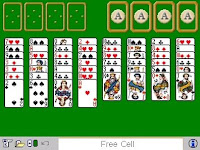Tempus Fugit
I had coffee last week with Todd Strasser, a prolific author of a gazillion wonderful books that kids of all ages adore. Like any two authors who meet, we swapped war stories (writers block survival tips, reviews that pierce the soul, clever ideas for how to commit [fictional] murder without being caught — frogs are involved). We then talked a little about how hard it is to remain focused and how to fight those distractions that take us out of the stories we’re writing.
Knowing that admitting a problem is the first step to dealing with it, I then made a confession. Checking to be sure that I wasn’t overheard, I mumbled my dirty little secret. “I’m a free cell addict.”
His face lit up in recognition of a fellow traveler. He checked my credentials. Did I let the computer randomly pick the games or did I hand select which ones I took on?
Here was a real pro. He promised to send me a list of the 100 toughest games; he’d found a web site that ranked them. I was set for life – or at least three books!
The seventeenth century English poet Edward Young warned “Procrastination is the thief of time.” On the other hand, Young was just penning rhymes about the execution of Lady Jane Grey. He wasn’t trying to figure out a method for Queen Mary to murder Ms. Jane without detection – or how Mac Sullivan and Rachel Brenner could trip up Mary before she killed again. Of course, another fabulous procrastination technique is Wikipedia where you learn incredibly useful information that you never previously knew – like who the heck is Edward Young and what did he have against an innocent game of free cell.
Frankly, I suspect that if Ed Young felt the need to make grand pronouncements about the folly of procrastination, then he probably had quite a few secret vices of his own to kill time when the iambic pentameter wasn’t flowing like water.
I always marvel at the author who explains, in her New York Times bestseller interview, that she got this inspiration for a book and the words just seemed to appear in full paragraphs on her computer screen. She wrote the entire draft in a single sitting of 67 days and never even checked a thesaurus because each word was perfect the first time around.
Which is why I play Free Cell. I make little deals with myself when I’m working on a book: If I write two paragraphs, then I can take a break and play a quick game. Ask me how many games I’ve played since starting this blog.
I know there are other fine ways to procrastinate. Believe me, when I’m really looking to kill time instead of victims, I’ve been known to take down all the curtains in the house and wash them. My husband can tell from the bare windows as he pulls into the driveway that I’ve hit a brick wall in the plot. But it could have been worse. I know one author who surfs E-bay to avoid writing. He recently bought himself a bison head instead of finishing chapter three.
Tempus fugit indeed.
Evelyn David




